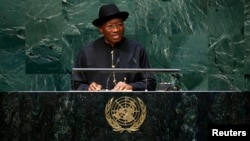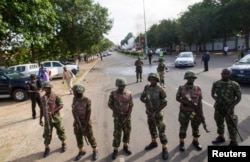Nigeria's military says it killed the man who has been posing as the head of Boko Haram and has pushed back the militants’ advance on the Borno state capital in the northeast. Nigerian President Goodluck Jonathan assured the U.N. General Assembly Wednesday that the country will "triumph over terrorism.”
In Nigeria in recent months, it has appeared Boko Haram is closing in on the Borno state capital Maiduguri. The militants were claiming village after village and cutting off roads and bridges. They declared an Islamic caliphate.
Nigerian Defense Headquarters now says hundreds of insurgents have surrendered. The military says it repelled four attempts by Boko Haram to take Konduga, seen as a strategic stepping stone to Maiduguri.
Still a long way to go
But Nigerian security analyst Abdullahi Wase says the tide has not yet turned in favor of the government, the military has a long fight ahead.
“Nigerians are expecting to hear that all these towns and cities where hundreds were killed and the inhabitants were expelled by those they call Boko Haram," he said. "Up to this moment I am talking to you, the villages are still under the control of these people and the original owners are refugees.”
Wase says Nigerians will not see the military with “the upper hand” until they recapture that territory. But the military does appear to be stopping Boko Haram’s advance.
In fighting at Konduga, defense spokesman Major General Chris Olukolade says the army killed hundreds of militants, including one man in particular, a militant commander known by many aliases.
“One Mohammed Bashir, who has been acting or posing on videos as the deceased Abubakar Shekau, that eccentric character known as leader of the group died in that operation,” said Olukolade.
Shekau, dead or alive?
Defense Headquarters distributed a photo of the corpse alongside a screenshot from a recent video. Arrows marked facial features they say are a match.
Whether Shekau is alive or dead has been a subject of debate for more than a year. Security officials say there is more than one Shekau. The army has announced the death of the original one at least three times since 2009.
It is hard to say how significant the death of this “lookalike” really is.
Senior Fellow at Center for Democracy and Development in Abuja, Jibrin Ibrahim, says it is not what matters. What matters, he says, is the surge they are seeing from the Nigerian military.
“That is what is important, that finally the army has picked up the capacity and the motivation to fight," he said. "The fact that many of the Boko Haram fighters are now being killed means they will start losing the confidence that every time they fight, victory would be theirs ... Now the army is fighting them. It is a major and dramatic and positive change in the war.”
But security analyst Wase says the announcement Nigerians are waiting for, the one that will mark a turning point in this crisis, is that the Chibok schoolgirls, and other women since taken by militants, are free.
“If those girls and women are not released, there is no Nigerian that will ever be happy that there is progress in what is happening,” he said.
Nearly 200 of the secondary schoolgirls taken from Chibok in April by Boko Haram are still missing.
Ubale Musa contributed to this report from Abuja.





